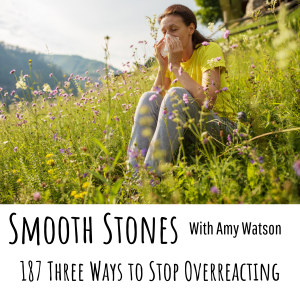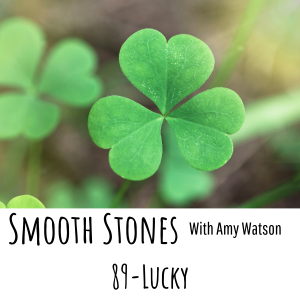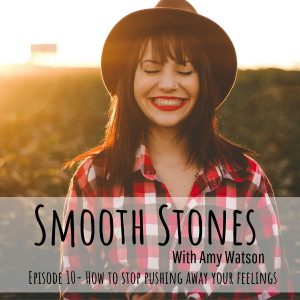Transcription
Hey, and welcome to episode 189 of the Smooth Stones Podcast. I’m your host, Amy Watson. I am a loss mom. I am a grief coach. I am a life coach, and I wanted to share with you something that I share with my clients, and I thought, I haven’t talked about it on the podcast, so I wanted to share it with you.
But that being said. Listening to a podcast is an awesome way to learn, to try new things, to get good information and support, but nothing compares to actually being coached, to actually taking the action of coming to talk to me of saying yes to yourself. And of joining one of my signature programs, I’ve got a pregnancy after Loss peace program.
I’ve got a LIFT program. Or if you don’t feel like either one of those fit, you just talk to me and I will make something. Just what you need to help you wherever you are in your grief and in your life. There’s something so magical about having someone you don’t need to explain things to. You don’t have to explain it to me because I’ve experienced stillbirth, I’ve experienced miscarriage, and I have helped hundreds of people go through every kind of loss.
I have been there in the hospital room with them on their hardest days, and I have been there with them when it’s 20 years later, and they still are holding onto a lot of pain and guilt. Whatever you’re struggling with, I can help you. So reach out. You can go in the show notes or go to smooth stones coaching.com.
Come on over. If you wanna see what I can share with you, you can sign up for my free mini course. It’s how to stop blaming yourself. I don’t know very many people who have lost a child, who don’t blame themselves in one way or another. So hop on over there, follow me on Instagram. You can watch this podcast on YouTube and get a little taste of what it’s like being on Zoom with me.
But I just want you to know that if you love the podcast, take the next step. Your life will change. I would love to be a part of that. I know you can do it. Okay, let’s talk about this. When I work with my clients, every time we meet or. You know, every week I’m checking on them and saying, check in with yourself.
How are things going? And I wanted to explain a really simple and easy way to do this for yourself. Now, you can do this every day, every morning, every night, weekly, uh, after a certain project, after a certain milestone. Whatever you want. You make it what you want. Please do not make this like another task that you feel like you have to do or that you’re not doing right, or whatever it is.
I always want things to be really simple, doable, and manageable for you, because I know we all have a lot going on, but there is a lot of power in the check in. I think a lot of us just go through life, going through the motions, going into survival mode, just like. Day after day after day task, after task, after task.
We’re scrolling. Our phones, we’re distracting ourselves. We’re in the car, we’re all over the place and we don’t stop. We really don’t have that pause anymore, and I think it’s really important. Uh, I was just listening to someone talking about. Prayer and how she had tried something where she was spending an hour in silence where she was just trying to get her day going, pray, and then have one hour of silence.
Now, that’s not possible for all of us, but that was something she was trying and, and I, as I heard her talking about it, I thought, wow. Yeah, that seems almost impossible for a lot of us to have an hour of silence.
But what a beautiful space to give yourself. So I’m not saying give yourself an hour of silence, but I am saying give yourself a few moments. Make the time. Put your attention here because you will. Get the results you want, you will start feeling better. You will start figuring out what works for you, what doesn’t, what you need, what you need to let go of.
Okay? So the first thing we wanna do whenever we’re checking in is check on your physical body.
And there are lots of ways to do kind of a body scan, but what I would encourage you to do is just take a moment and even close your eyes. Start at the top of your head, you know, breathe and just go down. Do you have pain anywhere? What’s your breathing like?
What’s your mouth like? Is it dry? Are your lips like just check in? Do you need chapstick? I am a like Chapstick addict, I would say. And I know people say they put stuff in it to make you an addict probably, right? But I have to have it always, and I always put it on in front in before my podcast recording so that I don’t have those dry lips smacking.
Um, but. Then just go down. Notice your jaw, notice your neck. Notice your shoulders. Notice your back. Where is there tension? Where might there be pain? Where’s feeling good? Right? We’re not just looking for problems. We wanna look for the good too. Where do you feel strong? What’s working how’s your digestion?
How’s your stomach? I think a lot of us have things manifest in our stomach, whether it’s because of the food we’re eating or the. Way we’re handling our anxiety and all of that, right? Our guts are trying to tell us something. So check in. You can even talk to them. Put your hand on your belly and talk to them,
and then just keep going down. How are your legs, your knees, your feet? How are the shoes you’re wearing? Are you cold? Are you hot? Like, what are you comfortable? This is really important. So just do a scan and listen Again, this isn’t a time to talk. This is just a time to listen to your body. Is there anything it wants to tell you?
, is there anything it wants you to do differently? It’s funny because I, where was I hearing this? Someone was talking about, I feel like it was at one of our Life Coach masterminds, but someone was talking about even going to the bathroom, like how we’ve been conditioned because of maybe like how schools are, how, you know, corporate life, whatever it is.
To even like when we notice that we have to go to the bathroom, we like won’t let ourselves, we have to hold it or we have to wait till an appropriate time or we have to, you know, it’s like we don’t even listen to our body in the most basic of needs. So I want you to listen, practice listening to your body, do what you need to do.
Then I want you checking on your nervous system. Now your nervous system is part of your body. It’s part of your brain. It’s the brain connecting to the body. It’s all mixed together, right? We’re not actually like these disembodied parts of us we’re. It’s all together, but our nervous system is that fight, flight, freeze, fawn reactions.
It’s. A lot of things. It’s what gets us moving. Sometimes it’s what makes us freeze. Sometimes we can feel a lot of anxiety. We can have a lot of like cortisol and all those fun hormones, um, stress hormones going, or we can be really relaxed and. I want you to just check in. Am I activated? Do I notice myself getting triggered a lot?
Like what is going on? Where am I now? And again, this is just in the moment. We’re just doing a check in. And I think something else I notice my client’s doing a lot is they’ll say like, oh my goodness, this thing was so upsetting, but like, I’m okay now, you know, I’m okay. I, I did this and this and this, and now, you know, maybe it’s not that big a deal.
We try to talk ourselves out of. Our humanness out of our reactions, out of what we’re feeling. And I just wanna encourage you that there’s no wrong way to be feeling. There’s no wrong way for your nervous system to be reacting right now. There’s no, none of this is to find problems. It’s just to be in the moment and check in with your body.
Check in with your nervous system because we don’t do it. We really don’t do it. It’s a beautiful thing to practice. So with those things being done, you can write down anything you notice.
If you’re hungry, you can eat. If you notice like, oh, Amy, now that I, you say that actually I have needed to go to the bathroom for a long time, but I was busy. I’m gonna go do that. Right? It’s like, how can you care for yourself? And then I want you to go through a few questions that are really simple. The first check-in question is what are your wins?
What are some wins? I always want you to celebrate yourself. Always, always, always. And make a practice of celebrating yourself in all areas of your life. I don’t think there’s a downside to celebrating yourself. You can’t do it too much. It’s really easy to be hard on ourselves, but it takes intention to be kind and encouraging to yourself and don’t we all want that?
So be your own best cheerleader. Look for those wins, and they will multiply and you will start seeing them everywhere, even when it’s hard. Then I want you to ask yourself, what’s working? What’s working in my life? Now you could pick a specific thing. Maybe it’s a relationship, maybe it’s a job. Maybe it’s your journey to growing your family, whatever it is, you could help to pick something specific and just say what’s working.
And again, this is choosing to look and see like, oh, actually this, this, this, and this are working for me. I’m, I feel proud of this. I. I am taking steps towards my goals or my dreams or whatever I want. Really noticing first what’s working is such a powerful thing to do. Then you can ask yourself what’s not working?
And this is the part where you are allowed to look for some problems, some obstacles, some things that you wish were different. Just say what’s not working. What am I not liking? What is not feeling really good or aligned with who I wanna be and what I wanna be doing with myself? What is not working? And then say, what do I wanna change?
How can I do better? I. And this is where we wanna open our mind up again. Instead of focusing on the problems we’re gonna recognize like, Hey, here’s some stuff that I would like to shift or make different, and we wanna jump right to figuring out a solution. I. Brainstorming, opening up. We are doing all of this with love.
This whole evaluation is with love. We are used to evaluations, being with judgment, with criticism, with like most of us don’t have really good experiences with evaluations, even if we get good ones. I think there’s a huge amount of stress in being evaluated, but. This isn’t gonna be like that. It’s gonna be different.
Like whether I check in with you ’cause you’re working with me, or whether you’re checking in with yourself. We are going with full love and compassion and radical self-acceptance. This isn’t about judging you, so just ask yourself what, ask yourself, what do I wanna change? How could I do that? I know that it’s, it’s a process.
It’s not gonna happen overnight. You didn’t get here overnight. It’s not gonna change overnight, but you also always have the opportunity to make shifts in your life. And then the last question is, what support do I need? This is a really important question that also I think we forget. We kind of think, well, we gotta pull ourselves up by our bootstraps.
We gotta do it ourselves. Like we gotta fix ourselves.
Or we found ourselves going to ways to help ourselves feel better that aren’t useful, like comfort food or scrolling our phone or just doing things that we know don’t help us get anywhere, right? A lot of procrastination, et cetera, which again, we’re not judging that we’re loving ourselves, but none of those things are really supporting you in your goals.
They’re not supporting you in the changes you wanna make. So you gotta figure out, and you gotta pinpoint what support do I need. Now, sometimes this can be tricky, it’s gonna be hard. You can say, I don’t know. I don’t have anybody I can trust with this. I don’t have anybody on my team. I feel like everybody at work is just making my life harder and I don’t know.
What support I need. Whenever you hear yourself saying, I don’t know, I want you to just again, pause within your pause and figure out what’s going on, I don’t know, is a big wall that you build between where you are and where you wanna be, and it’s okay to not know right away. But just keep telling yourself, I’m gonna keep thinking about it.
I’m gonna open up to it. I’m gonna think of ideas that maybe I’ve never thought about. I’m gonna get outside of this box that I’ve built for myself, and I’m gonna figure out what support I need. So whether it’s coming and working with me, which I think is always a great idea, uh, for whatever challenge you’re facing or talking to your partner.
Talking to your coworkers, talking to someone else, putting things in place, and it’s not always other people, right? The support you need might be meal planning. If you scanned your body and you’re like, oh my gosh, I’ve been kind of like awful to my body for a while and I want to eat better. Your support might be
creating a meal plan or like getting better food in the house, or whatever it is. Right, but how can we make this easy? How can we make this fun? Um, how can we make it manageable for you wherever you are in your grief? So here are the questions to ask yourself. What’s working? What’s not working? What do I wanna change and what support do I need in order to do that?
When we do these check-ins, the benefit is. Actually amazing, like with most of these tools that I share with you. It’s very simple, but the difference is it’s intentional. So I’m gonna encourage and challenge you to spend a few minutes every day or whenever you would like, just checking in with yourself.
If you notice yourself in a really stressful situation, check in with yourself. Before, during, or after. See how you’re doing. Use love always as your guide. ’cause you are an amazing human being and you are doing some really hard stuff and I believe in you. So that’s how we do a real simple check-in. That is very, very powerful.
If you would like to know more, please reach out to me. Uh, you can email me, amy@smoothstonescoaching.com or go to my website, smooth stones coaching.com. I’ve got lots of cool stuff over there for you. You’re not alone in this. Keep going. I’ll see you next time.




